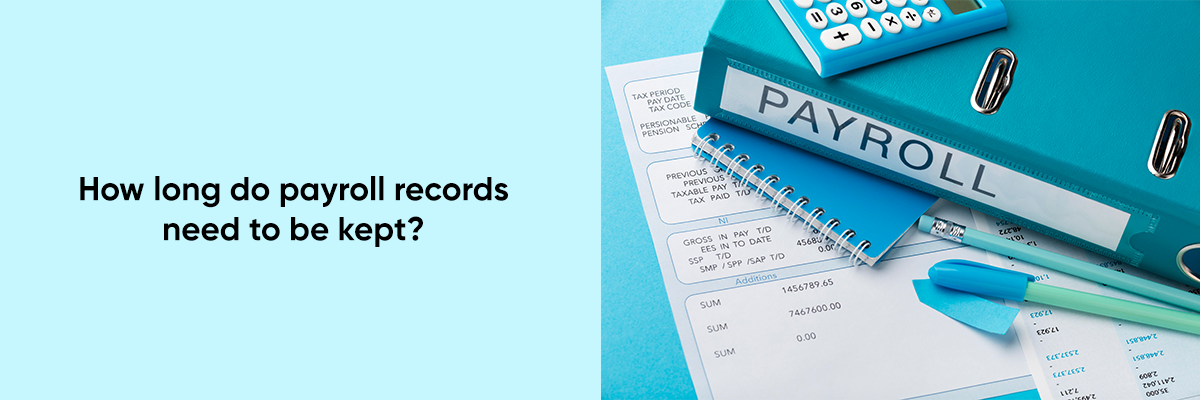Maintaining payroll records is a critical responsibility for businesses of all sizes. Properly keeping these records is not just a matter of good bookkeeping; it is also a legal requirement that can have significant implications for a business. Knowing how long payroll records should be kept helps businesses stay compliant with various regulations, avoid penalties, and prepare for any potential audits.
This article explores the duration for which payroll records need to be maintained and the factors that influence this period.



Legal Requirements for Keeping Payroll Records
The duration for which payroll records must be kept varies depending on the laws and regulations set forth by different authorities. The primary regulations governing payroll record retention include:
- Fair Labor Standards Act (FLSA):
Under the FLSA, employers are required to keep payroll records for at least three years. This includes all records related to wages, hours worked, and other conditions of employment. Additionally, records that support wage calculations, such as timecards and piece-rate computations, must be retained for two years. - Internal Revenue Service (IRS):
For tax purposes, the IRS mandates that employers keep payroll records for a minimum of four years after the tax becomes due or is paid, whichever is later. This requirement ensures that all information necessary for the accurate filing of employment taxes, such as income, Social Security, and Medicare taxes, is readily available. - Equal Employment Opportunity Commission (EEOC):
The EEOC requires employers to retain payroll records for at least one year. However, if an employee is terminated, employers must keep the employee’s records for one year from the date of termination. These records help demonstrate compliance with anti-discrimination laws. - State Laws:
State laws may have different requirements regarding the retention of payroll records. For example, some states require employers to keep records for up to six or seven years. Employers should consult their state’s specific requirements to ensure compliance. - Family and Medical Leave Act (FMLA):
Under the FMLA, employers must keep payroll records and other documentation related to employees’ leave for three years. This includes records related to leave requests, FMLA notices, and policies on employee benefits.
Types of Payroll Records to Keep
Payroll records encompass a wide range of documents and data points. The following are some of the most critical types of payroll records that employers must retain:
- Employee Information: Name, address, Social Security number, job title, and other personal data.
- Pay Rate and Compensation: Details of wages or salary, including hourly rates, overtime rates, bonuses, and commissions.
- Timekeeping Records: Timecards, timesheets, and records of hours worked, including regular and overtime hours.
- Payroll Registers: Summaries of payroll data, including gross pay, net pay, deductions, and tax withholdings.
- Tax Documents: Copies of W-2s, W-4s, 1099s, and other tax-related documents.
- Direct Deposit and Paycheck Stubs: Records of direct deposit authorizations and copies of paycheck stubs issued to employees.
- Benefits and Deductions Records: Documentation of benefits provided, including health insurance, retirement plans, and any other deductions from paychecks.
- Employee Leave Records: Records of leave taken under FMLA, paid time off (PTO), sick leave, and vacation.
Why Keeping Payroll Records is Important
There are some common mistakes while keeping payroll records which should be avoided. Maintaining accurate and complete payroll records is vital for several reasons:
- Legal Compliance:
Compliance with federal, state, and local regulations requires proper recordkeeping. Failure to retain records for the required duration can result in penalties, fines, and legal action. - Audit Preparation:
Employers may be subject to audits by the IRS, the Department of Labor, or state agencies. Having well-organized payroll records can simplify the audit process and reduce the risk of penalties. - Employee Disputes:
In the event of a dispute with an employee over wages, hours worked, or benefits, payroll records can provide essential documentation to resolve the issue. - Business Management:
Payroll records provide valuable insights into labor costs, productivity, and other metrics that can inform business decisions.
Conclusion
Knowing how long to keep payroll records is crucial for businesses to remain compliant with legal requirements and to be prepared for potential audits or disputes. Employers should retain payroll records for a minimum of three to seven years, depending on the type of record and applicable regulations. By implementing effective recordkeeping practices and understanding the legal requirements, businesses can ensure they are well-prepared to handle any issues that may arise related to payroll records.


